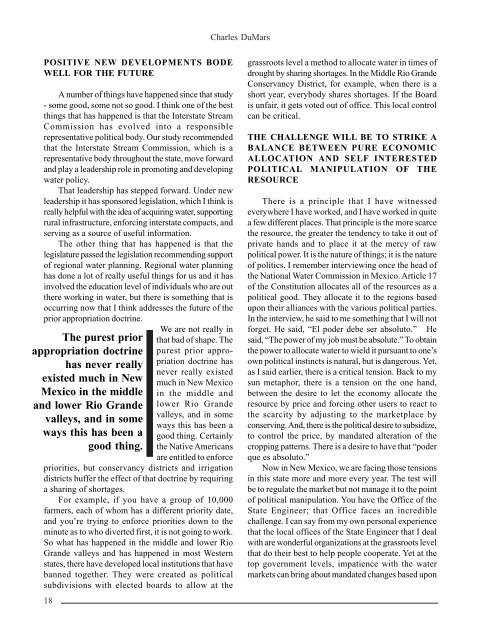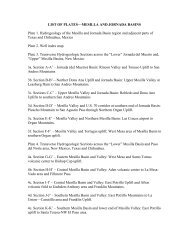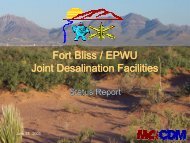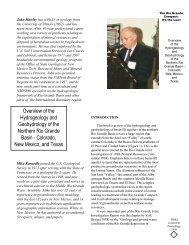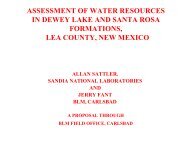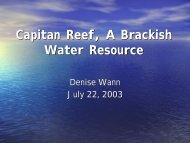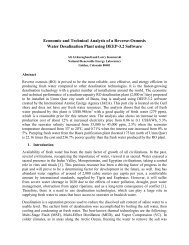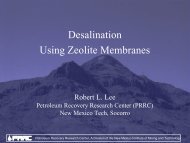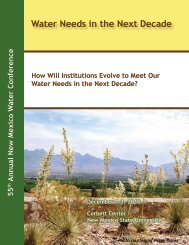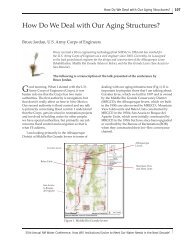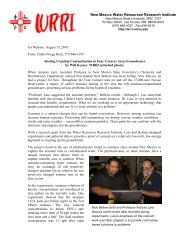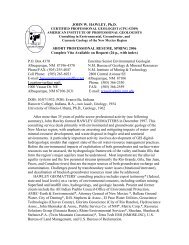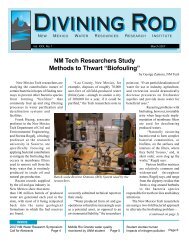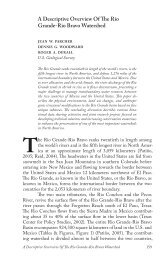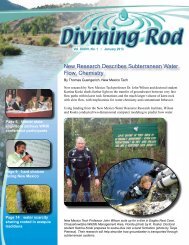Charles T. DuMars - Water Resources Research Institute
Charles T. DuMars - Water Resources Research Institute
Charles T. DuMars - Water Resources Research Institute
You also want an ePaper? Increase the reach of your titles
YUMPU automatically turns print PDFs into web optimized ePapers that Google loves.
<strong>Charles</strong> <strong>DuMars</strong><br />
POSITIVE NEW DEVELOPMENTS BODE<br />
WELL FOR THE FUTURE<br />
A number of things have happened since that study<br />
- some good, some not so good. I think one of the best<br />
things that has happened is that the Interstate Stream<br />
Commission has evolved into a responsible<br />
representative political body. Our study recommended<br />
that the Interstate Stream Commission, which is a<br />
representative body throughout the state, move forward<br />
and play a leadership role in promoting and developing<br />
water policy.<br />
That leadership has stepped forward. Under new<br />
leadership it has sponsored legislation, which I think is<br />
really helpful with the idea of acquiring water, supporting<br />
rural infrastructure, enforcing interstate compacts, and<br />
serving as a source of useful information.<br />
The other thing that has happened is that the<br />
legislature passed the legislation recommending support<br />
of regional water planning. Regional water planning<br />
has done a lot of really useful things for us and it has<br />
involved the education level of individuals who are out<br />
there working in water, but there is something that is<br />
occurring now that I think addresses the future of the<br />
prior appropriation doctrine.<br />
The purest prior<br />
appropriation doctrine<br />
has never really<br />
existed much in New<br />
Mexico in the middle<br />
and lower Rio Grande<br />
valleys, and in some<br />
ways this has been a<br />
good thing.<br />
18<br />
We are not really in<br />
that bad of shape. The<br />
purest prior appropriation<br />
doctrine has<br />
never really existed<br />
much in New Mexico<br />
in the middle and<br />
lower Rio Grande<br />
valleys, and in some<br />
ways this has been a<br />
good thing. Certainly<br />
the Native Americans<br />
are entitled to enforce<br />
priorities, but conservancy districts and irrigation<br />
districts buffer the effect of that doctrine by requiring<br />
a sharing of shortages.<br />
For example, if you have a group of 10,000<br />
farmers, each of whom has a different priority date,<br />
and you’re trying to enforce priorities down to the<br />
minute as to who diverted first, it is not going to work.<br />
So what has happened in the middle and lower Rio<br />
Grande valleys and has happened in most Western<br />
states, there have developed local institutions that have<br />
banned together. They were created as political<br />
subdivisions with elected boards to allow at the<br />
grassroots level a method to allocate water in times of<br />
drought by sharing shortages. In the Middle Rio Grande<br />
Conservancy District, for example, when there is a<br />
short year, everybody shares shortages. If the Board<br />
is unfair, it gets voted out of office. This local control<br />
can be critical.<br />
THE CHALLENGE WILL BE TO STRIKE A<br />
BALANCE BETWEEN PURE ECONOMIC<br />
ALLOCATION AND SELF INTERESTED<br />
POLITICAL MANIPULATION OF THE<br />
RESOURCE<br />
There is a principle that I have witnessed<br />
everywhere I have worked, and I have worked in quite<br />
a few different places. That principle is the more scarce<br />
the resource, the greater the tendency to take it out of<br />
private hands and to place it at the mercy of raw<br />
political power. It is the nature of things; it is the nature<br />
of politics. I remember interviewing once the head of<br />
the National <strong>Water</strong> Commission in Mexico. Article 17<br />
of the Constitution allocates all of the resources as a<br />
political good. They allocate it to the regions based<br />
upon their alliances with the various political parties.<br />
In the interview, he said to me something that I will not<br />
forget. He said, “El poder debe ser absoluto.” He<br />
said, “The power of my job must be absolute.” To obtain<br />
the power to allocate water to wield it pursuant to one’s<br />
own political instincts is natural, but is dangerous. Yet,<br />
as I said earlier, there is a critical tension. Back to my<br />
sun metaphor, there is a tension on the one hand,<br />
between the desire to let the economy allocate the<br />
resource by price and forcing other users to react to<br />
the scarcity by adjusting to the marketplace by<br />
conserving. And, there is the political desire to subsidize,<br />
to control the price, by mandated alteration of the<br />
cropping patterns. There is a desire to have that “poder<br />
que es absoluto.”<br />
Now in New Mexico, we are facing those tensions<br />
in this state more and more every year. The test will<br />
be to regulate the market but not manage it to the point<br />
of political manipulation. You have the Office of the<br />
State Engineer; that Office faces an incredible<br />
challenge. I can say from my own personal experience<br />
that the local offices of the State Engineer that I deal<br />
with are wonderful organizations at the grassroots level<br />
that do their best to help people cooperate. Yet at the<br />
top government levels, impatience with the water<br />
markets can bring about mandated changes based upon


